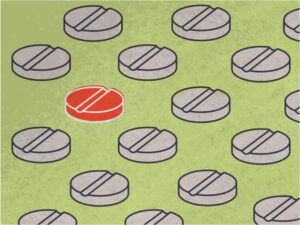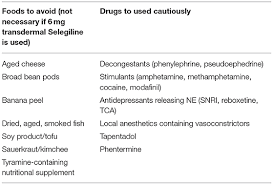If you are one of the millions of people who suffer from depression, you may be interested in learning about aminoketone antidepressants. This drug guide will provide you with important information about aminoketone antidepressant such as how it works, how long it takes to work, common side effects, and more. So whether you are just starting a treatment or have been taking aminoketone for a while, be sure to read this guide!
Contents
Understanding Aminoketone Antidepressant

Aminoketone antidepressant is a medication that is used to treat depression. It belongs to a class of drugs called monoamine oxidase inhibitors (MAOIs). MAOIs work by preventing the breakdown of certain chemicals in the brain, which helps to improve mood.
Mechanism of Action
Aminoketone antidepressant works by inhibiting the enzyme monoamine oxidase. Monoamine oxidase is responsible for breaking down neurotransmitters such as serotonin and norepinephrine. Thus, by inhibiting this enzyme, aminoketone increases the levels of these neurotransmitters in the brain, which leads to improved mood.
How Long Does It Take To Work
Aminoketone antidepressant typically takes two to four weeks to start working. However, some people may experience relief from their symptoms within a week. Moreover, it is important to remember that aminoketone is not a cure for depression, but it can help to improve symptoms.
Types of Antidepressant
- Monoamine Oxidase Inhibitors (MAOIs),
- Selective Serotonin Reuptake Inhibitors (SSRIs),
- Serotonin-Norepinephrine Reuptake Inhibitors (SNRIs),
- Tricyclic Antidepressants (TCAs)
Aminoketones were first developed in the 1950s, but they were not approved for use in the United States until 1987. Moreover, they are typically prescribed for people who have not responded well to other types of antidepressant medications.
Important Information About Aminoketone Antidepressants
- You should not drink alcohol while taking aminoketone, as this can increase the risk of side effects.
- Aminoketone may cause a false-positive result on a urine drug screen. If you are taking a urine drug screen, tell the laboratory staff that you are taking aminoketone.
- Aminoketone may cause a dangerous increase in blood pressure if taken with certain other medications. Be sure to tell your doctor about all other medications you are taking, including over-the-counter drugs and vitamins.
- Aminoketone may cause changes in mood or behavior. Tell your doctor if you have any changes in mood or behavior, especially if you experience:
- anxiety
- hostility
- agitation
- irritability
- hypomania
- panic attacks
- restlessness
- unusual thoughts or behaviors
- hyperactivity (mental or physical)
Things I Should Tell My Doctor Before Taking Aminoketone
To make sure aminoketone is safe for you, tell your doctor if you have:
- migraines or headaches
- a history of heart disease or stroke
- high cholesterol or triglycerides
- a history of drug abuse or addiction
- a history of blood clotting disorders or taking blood thinners
Specific Concerns About Aminoketone And Pregnancy
Aminoketone may be harmful to an unborn baby and may cause birth defects or other problems if taken during pregnancy. Do not take aminoketone if you are pregnant.
It is not known whether aminoketone passes into breast milk or if it could harm a nursing baby. You should not breastfeed while taking aminoketone.
NOTE: Aminoketone should not be given to a child younger than 18 years old. Do not give this medicine to anyone under 18 years old without medical advice. Plus, older adults may be more sensitive to the side effects of this drug, especially bleeding and QT prolongation (see above).
Administering Aminoketone Antidepressant

Aminoketone antidepressant is typically taken two or three times a day. It can be taken with or without food. If you experience stomach upset, you may want to take aminoketone with food.
It is important to follow the instructions of your doctor when taking an aminoketone antidepressant.
- Do not take more or less than prescribed.
- Do not stop taking aminoketone suddenly, as this can cause withdrawal symptoms.
What Should I Avoid While Taking Aminoketone Antidepressants
- You should avoid drinking alcohol while taking aminoketone. Alcohol can increase the risk of drowsiness and dizziness.
- Aminoketone may also cause dry mouth. Drink plenty of fluids to stay hydrated and avoid sugary drinks.
- Aminoketone may cause drowsiness or dizziness. Do not drive or operate heavy machinery until you know how this medication affects you.
What Happens If I Miss A Dose Of Aminoketone Antidepressants
If you miss a dose of aminoketone antidepressant, take the missed dose as soon as you remember. If it is almost time for your next dose, skip the missed dose and take the next dose at the regular time. Do not take two doses of aminoketone at the same time.
What Happens If I Overdose With Aminoketone Antidepressants
If you overdose on an aminoketone antidepressant, seek medical attention immediately. Moreover, symptoms of an overdose may include:
- drowsiness,
- dizziness, and
- vomiting.
Evaluating Aminoketone Antidepressant

Aminoketone antidepressant is typically evaluated based on the severity of the depression symptoms. Expectedly, the medication may be ineffective for some people. So, if you do not notice any improvement in your symptoms after taking aminoketone for several weeks, be sure to talk to your doctor.
Common Side-effects
The most common side effects of aminoketone antidepressants safe and normal. For instance:
- dry mouth,
- constipation,
- dizziness, and
- drowsiness.
These side effects typically go away after a few days or weeks of treatment.
Rare/serious Side-effects
More serious side effects of aminoketone antidepressants are rare yet reported. For instance:
- confusion,
- agitation,
- hallucinations, and
- serotonin syndrome
Risks For Taking Aminoketone For Long Periods
Aminoketone antidepressant is typically safe to take for long periods. However, there is a small risk of developing liver damage if the medication is taken for extended periods. So, if you experience any symptoms of liver damage, such as fatigue or yellowing of the skin, be sure to talk to your doctor.
Withdrawal Symptoms
Aminoketone antidepressants can cause withdrawal symptoms if they are stopped suddenly. For instance, symptoms of withdrawal may include:
- nausea,
- vomiting,
- sweating, and
- anxiety.
NOTE: If you experience any of these symptoms after stopping aminoketone, be sure to talk to your doctor.
Medications That May Interact With Aminoketone
Aminoketone antidepressants can interact with other medications. Therefore, it is important to tell your doctor about all the medications you are taking, including over-the-counter drugs and supplements.
However, some of the medications that may interact with aminoketone include:
- tricyclic antidepressants,
- MAO inhibitors, and
- SSRIs.
Moreover, you should not take aminoketone if you have taken an MAOI within the past 14 days. Such as:
- isocarboxazid (Marplan),
- phenelzine (Nardil),
- selegiline (Eldepryl, Emsam, Zelapar), or
- tranylcypromine (Parnate).
NOTE: Taking aminoketone with these medications can increase the risk of side effects, such as drowsiness and dizziness. Therefore, it is important to talk to your doctor before taking aminoketone with any other medications.
Alternatives To Aminoketone Antidepressants
There are many alternative treatments for depression, such as:
- psychotherapy,
- exercise, and
- dietary changes.
These alternatives may be effective for some people who do not respond to aminoketone. However, if you are considering an alternative treatment for depression, be sure to talk to your doctor first. Since your doctor can help you find the best medication or treatment modality for your needs.
Managing Side-effects Of Aminoketone

The side effects of aminoketone can be managed by:
- drinking plenty of fluids,
- eating a high-fiber diet, and
- avoiding alcohol.
NOTE: If the side effects of aminoketone are severe, your doctor may recommend a lower dose or a different medication.
DISCLAIMER
The information provided in this guide is not intended as medical advice. This guide is for informational purposes only and does not replace the need for a consultation with a medical professional. Moreover, if you are considering taking an aminoketone antidepressant, be sure to talk to your doctor first. Since your doctor can help you decide if aminoketone is right for you.
Conclusion
Aminoketone antidepressant is typically a safe and effective medication for treating depression. However, it is important to talk to your doctor about all the risks and benefits of taking aminoketone before starting treatment. Since aminoketone antidepressants can interact with other medications and should not be taken with alcohol or certain foods. Moreover, if you are looking for alternatives to aminoketone antidepressants, there are several other options available. As your doctor can help you find the best medication for your needs.
A Word From Therapy Mantra
Your mental health — Your psychological, emotional, and social well-being — has an impact on every aspect of your life. Positive mental health essentially allows you to effectively deal with life’s everyday challenges.
At TherapyMantra, we have a team of therapists who provide affordable online therapy to assist you with issues such as depression, anxiety, stress, workplace Issues, addiction, relationship, OCD, LGBTQ, and PTSD. You can book a free therapy or download our free Android or iOS app.


